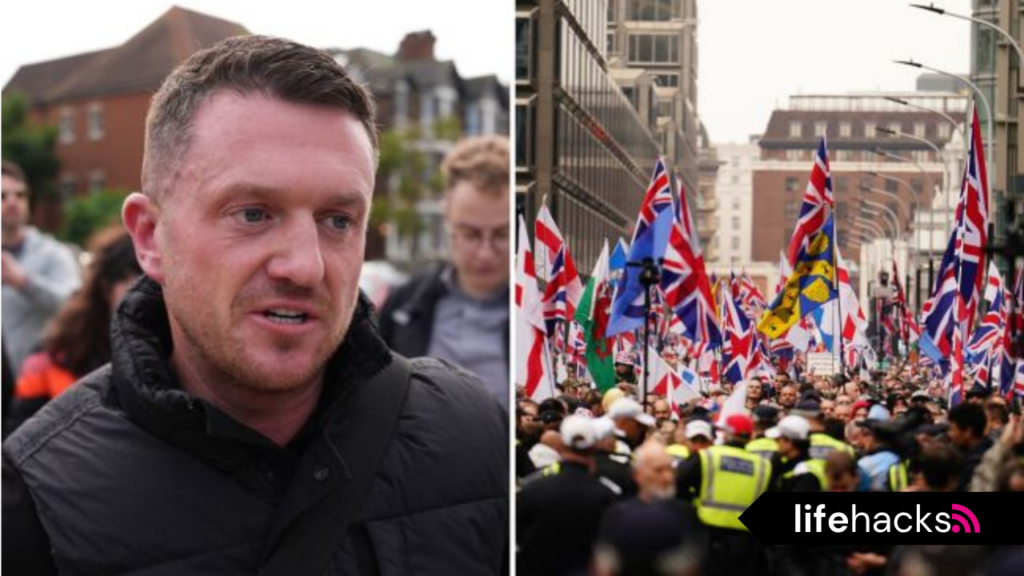Tommy Robinson has once again become the source of public unrest following his jailing ahead of a significant London protest by his supporters. His arrest comes just days before the scheduled “Unite the Kingdom” march, which aimed at garnering support for him and highlighting his claims of being silenced for speaking against immigration into the UK.
Robinson, 35, whose real name is Stephen Yaxley-Lennon, was arrested at the High Courts behest on suspicion of contempt of court and has been charged with a separate offence of failing to provide the PIN for his mobile phone during a stop at the border in Folkestone in July. The Terrorism Act charge has nothing to do with the terror plot but provides the police with powers to scrutinize phones at borders for investigative purposes. The activist will appear on Monday at Woolwich Crown Court for the contempt charges and at Westminster Magistrates’ Court on November 13 regarding the incident with the phone.

Table of Contents
ToggleControversial Figure and Mounting Tensions
Tommy Robinson’s arrest immediately caused outrage among his followers, who view him as a champion of free speech and a critic of the impact of immigration on British society. In the days and weeks leading up to his detention, Robinson had been encouraging his followers to come to London and was accusing the state of trying to silence him for expressing unpopular opinions. Plans for the rally had been made for Saturday, but Robinson wasn’t there; instead, thousands of his supporters swamped central London to show their support for their jailed figurehead.
The Metropolitan Police had been aware of the risk of potential unrest and implemented a major security operation to manage the demonstrations. The first march was met with a wall of police officers lining the streets to separate Robinson’s supporters from a counter-demonstration organized by Stand Up to Racism, which slammed the rhetoric employed by the far-right activist and called for unity against hate.

Protests and Counter-Protests Collide
The absence of Robinson himself did little to deter his supporters, who congregated around Victoria Station before moving towards Parliament Square. The protest was punctuated with intermittent chants of “Oh Tommy, Tommy” from a largely white, male crowd waving Union flags. Because so many had attended, the march was late getting underway, with the crowd of supporters held back at an early stage by a line of police officers.
The scene became increasingly tense due to a counter-demonstration held nearby, organized by Stand Up to Racism. Anti-racism protesters waived banners declaring “Refugees Welcome” and “Oppose Tommy Robinson” in stark contrast with the far-right rally. Conflicts between the two groups were minimal, thanks to the significant police presence aiming to keep the two groups apart, but some incidents did occur, and at least five people were arrested. Among the charges filed were assault and racially aggravated public order offenses as tensions ran high amidst increased security.
Elsewhere in London, another march was conducted by the United Families and Friends Campaign, remembering those who died in police custody while joining calls for justice with broader concerns about racism and state violence. The campaign gathered at Trafalgar Square and marched to Downing Street, adding another layer to today’s protests and underlining the complex web of social issues at play.
Robinson's Legal Troubles Continue
Robinson, 41, has a chequered history with the law with past convictions including contempt of court, assault, and mortgage fraud. His current trial relates to his alleged breach of a 2021 High Court order after he repeated claims – ruled to be defamatory – against a Syrian refugee who successfully sued him. His arrest for refusing to give police the access code to his phone also made front page headlines, over his allegedly breaching border control procedures.
This is about the controversial founder of the now-defunct English Defence League and remains a divisive figure in British politics. Critics say that he deliberately divides people, and that he’s been at the forefront of anti-immigrant sentiment this summer. Supporters of Robinson viewed him as a victim of censorship, and thousands came out to support him to protest what they saw as an attempt to silence those with unpopular opinions.
Also Recommended Read : Apparent Trump Assassination Attempt: Key Details and Updates
A Divisive Figure in the Spotlight
Meanwhile, despite repeated defeats in the courts, Tommy Robinson remains highly influential. His social media platforms, reinvigorated since he was banned from Twitter in 2018, saw him return to the platform-now rebranded as X-following Elon Musk’s acquisition, on which he has gained over a million followers.
As the row between Robinson’s supporters and opponents rages on, his case has cast a spotlight on tensions relating to free speech, immigration, and national identity in the UK. The “Unite the Kingdom” rally may have gone ahead without its primary speaker, but the issues it brought to light have only intensified, revealing deep societal divisions that extend far beyond one activist’s legal battles.
The arrest of Tommy Robinson has reignited tensions in London, with thousands of his supporters and counter-protesters clashing in the streets. As Robinson awaits a court hearing, his followers continue to call for his release, while anti-racism demonstrators push back against his controversial stance on immigration. The heightened police presence and public unrest highlight the ongoing divide over issues of nationalism, racism, and freedom of speech in the UK.
